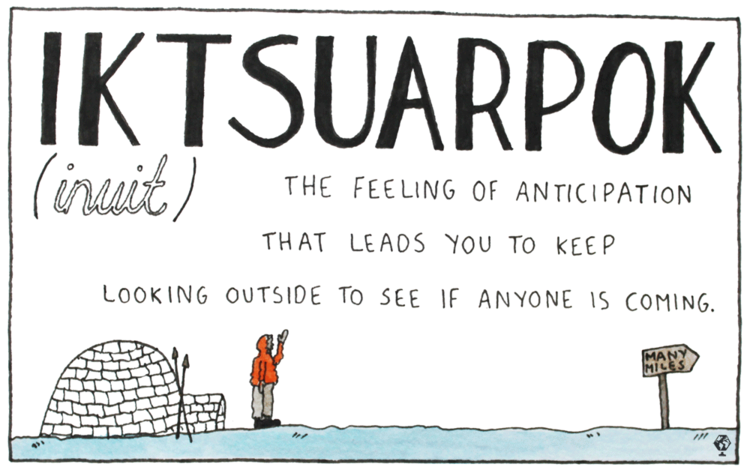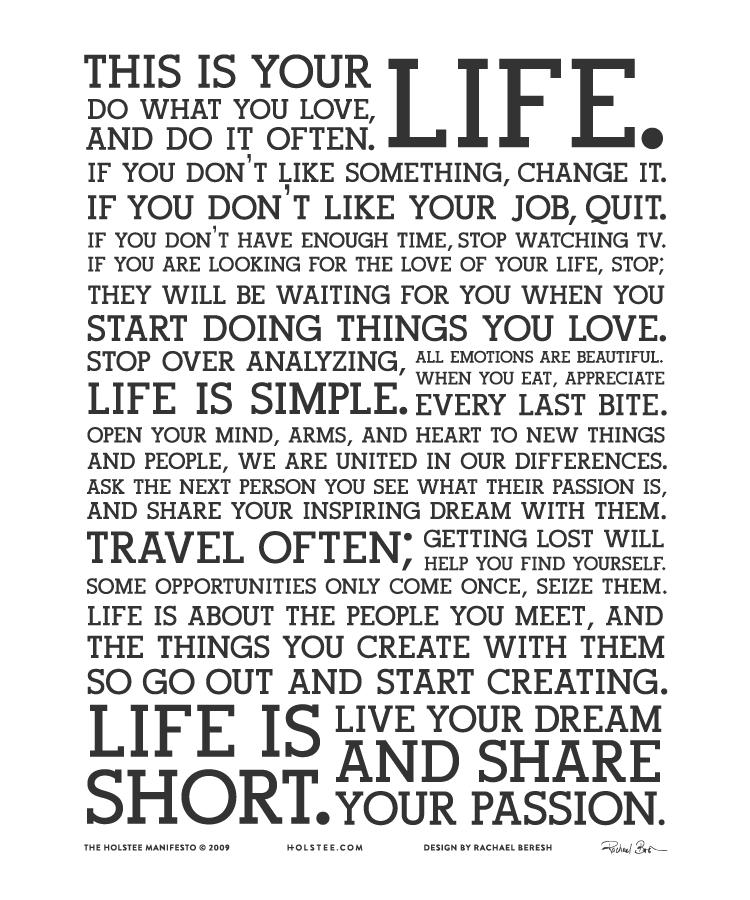Add a little iktsuarpok into your work life
A few months ago, our TechStars sister startup Maptia published a blog post featuring untranslatable words from other cultures.
One of the words that stood out to me is the Inuit word iktsuarpok, “the feeling of anticipation that leads you to keep looking outside to see if anyone is coming.” It struck me because I have definitely felt that before, without being able to express it in words. And it surprised me even more because, in a way, I’ve experienced this at work.
 Illustrator: Ella Frances Sanders (Look out for her book later this year, based on the original untranslatable words illustrations)
Illustrator: Ella Frances Sanders (Look out for her book later this year, based on the original untranslatable words illustrations)
I think we’ve all felt at one point or another that buzz of energy we get when we’re really passionate about something we’re working on - a feeling that you’re simply dying to get to work on that project, you can’t contain your excitement, you want to share your ideas with your team members, and you’d like to tell everybody and their mother what you’re working on.
You’re on a roll, in the zone, on your game, centered, in the groove, present, in tune, on fire.
That’s iktsuarpok at work. And it’s a sweet, sweet feeling.
The problem is that not enough people get to experience it. Going through the 8 hour work day, 2-3 hours of daily commute, the stresses of work and personal life alike and other people’s expectations of us can definitely take a toll on our ability to find the joy in our work.

It’s up to us to find the spark and turn it into a wildfire.
Flow
The closest thing to iktsuarpok at work might be the state of flow, as proposed by psychology professor Mihály Csikszentmihalyi.
Flow is a state of completely focused motivation, where single-minded immersion takes over. It’s the ultimate feat of focusing your attention and containing your emotions to complete a task.
Yet the state of flow places more of on emphasis on deep focus rather than the joy and anticipation of iktsuarpok. In fact, iktsuarpok at work seems to incorporate flow, but takes it one step further by also including the pure joy and anticipation you derive from work.
The good news is that both flow and iktsuarpok can be achieved, now matter what your line of work is.
In a 1997 article on finding flow, professor Mihály Csikszentmihalyi writes that “even the most mundane job can produce flow, when approached without too many cultural prejudices and with a determination to make it personally meaningful.” He goes on to say:
“If, instead of spending a lot of effort trying to cut corners, one spent the same amount of attention trying to find ways to accomplish more on the job, one would enjoy working--more and probably be more successful.”
Actually caring about the work you do can take you one step closer to the state of flow.
Another way to approach this state, according to professor Csikszentmihalyi, is to prioritize. That means having a to-do list and then quickly deciding which items on the list to delegate, which ones to forget, which ones to personally take care of and in what order. Deciding what to do about a task and when to do it can transform an anxiety-filled situation into a flow experience.
So that’s a way to enter flow. Now how do you take your work from flow to iktsuarpok? Here are some things that you can work with, from people who have expressed it quite elegantly.
Charles Bukowski: Go all the way
“If you’re going to try, go all the way. Otherwise, don’t even start. This could mean losing girlfriends, wives, relatives and maybe even your mind. It could mean not eating for three or four days. It could mean freezing on a park bench. It could mean jail. It could mean derision. It could mean mockery — isolation. Isolation is the gift. All the others are a test of your endurance, of how much you really want to do it. And, you’ll do it, despite rejection and the worst odds. And it will be better than anything else you can imagine. If you’re going to try, go all the way. There is no other feeling like that. You will be alone with the gods, and the nights will flame with fire. You will ride life straight to perfect laughter. It’s the only good fight there is.” - Charles Bukowski, Factotum
Paul Graham: Always produce
"Another test you can use is: always produce. For example, if you have a day job you don't take seriously because you plan to be a novelist, are you producing? Are you writing pages of fiction, however bad? As long as you're producing, you'll know you're not merely using the hazy vision of the grand novel you plan to write one day as an opiate. The view of it will be obstructed by the all too palpably flawed one you're actually writing." Paul Graham, How to do what you love
The Holstee Manifesto: Do what you love, and do it often
Steve Jobs: Don’t settle
Your work is going to fill a large part of your life, and the only way to be truly satisfied is to do what you believe is great work. And the only way to do great work is to love what you do. If you haven’t found it yet, keep looking. Don’t settle. As with all matters of the heart, you’ll know when you find it. And, like any great relationship, it just gets better and better as the years roll on. So keep looking until you find it. Don’t settle.” - Steve Jobs, 2005 Stanford Commencement address
How do you put your love in your work? Share with us what makes you burn with passion in the comments below.
